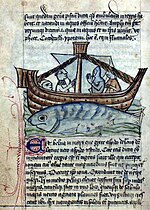 | Siren (mythology) (section Physiologus and bestiaries) leading to the commingling involve the treatment of sirens in the medieval Physiologus and bestiaries, both iconographically, as well as textually in translations... 56 KB (5,630 words) - 16:49, 13 May 2024 |
 | Bern Physiologus (Bern, Burgerbibliothek, Codex Bongarsianus 318) is a 9th-century illuminated copy of the Latin translation of the Physiologus. It was... 2 KB (202 words) - 17:17, 16 January 2022 |
 | The Icelandic Physiologus is a translation into Old Icelandic of a Latin translation of the 2nd-century Greek Physiologus. It survives in fragmentary... 11 KB (1,302 words) - 08:06, 10 September 2022 |
 | According to the tradition of the Physiologus and medieval bestiaries, the aspidochelone is a fabled sea creature, variously described as a large whale... 22 KB (3,160 words) - 05:27, 8 April 2024 |
 | from a single creature called the aspidochelone in the Physiologus. The Icelandic Physiologus contains two illustrations of the aspidochelone, one with... 3 KB (319 words) - 08:46, 6 August 2023 |
 | déndron peridéxion) or perindens is a mythological tree discussed in the Physiologus, an early Greek-language Christian didactic text and compendium, and... 8 KB (875 words) - 00:25, 6 January 2024 |
 | fox-sized ants that dug up gold in sandy areas. Some versions of the Physiologus said they came from Ethiopia, while Herodotus claimed they were located... 5 KB (552 words) - 23:39, 27 March 2024 |
 | 318 – Physiologus Bernensis". e-codices. Retrieved 11 September 2022., facsimile, fol. 13v Woodruff, Helen (September 1930). "The Physiologus of Bern:... 211 KB (20,047 words) - 22:57, 26 April 2024 |
('sea-reek') and lyngbakr ('heather-back'). The aspidochelone of the Physiologus is identified as the potential source for the hafgufa lore. Although... 35 KB (2,642 words) - 20:32, 6 May 2024 |

